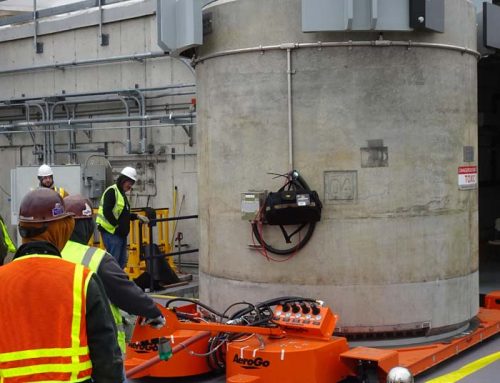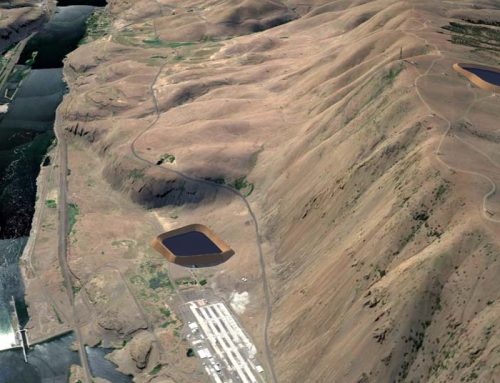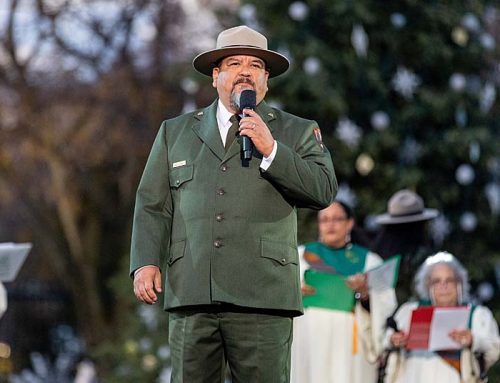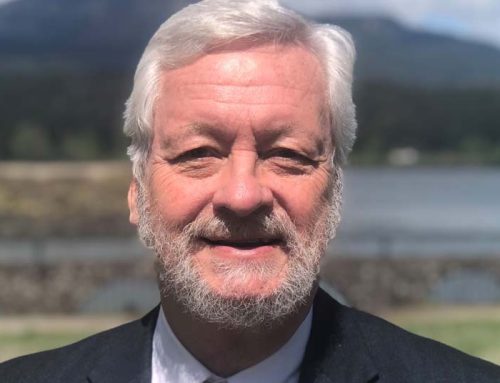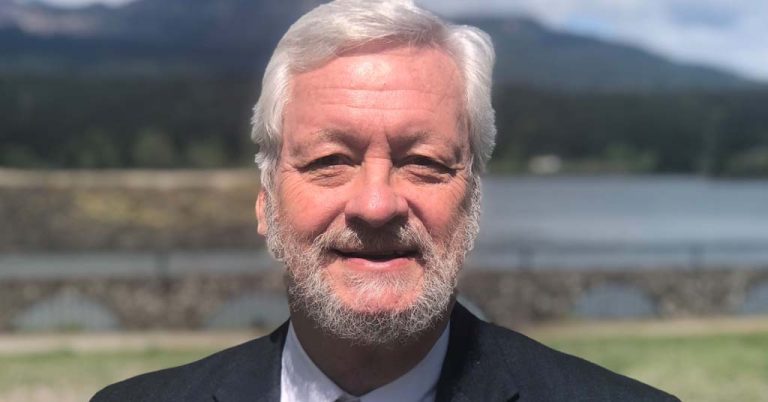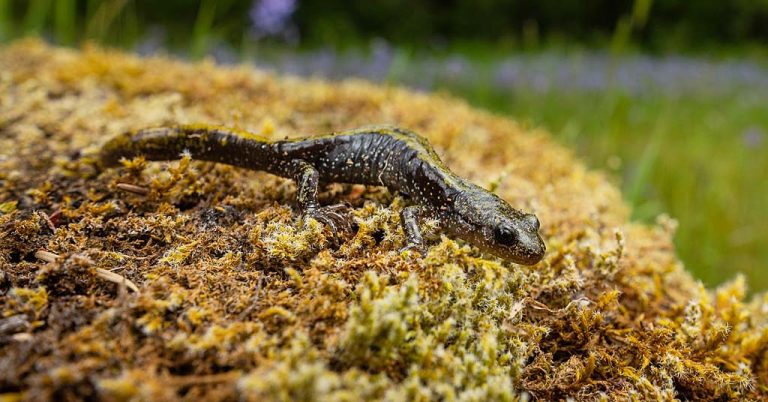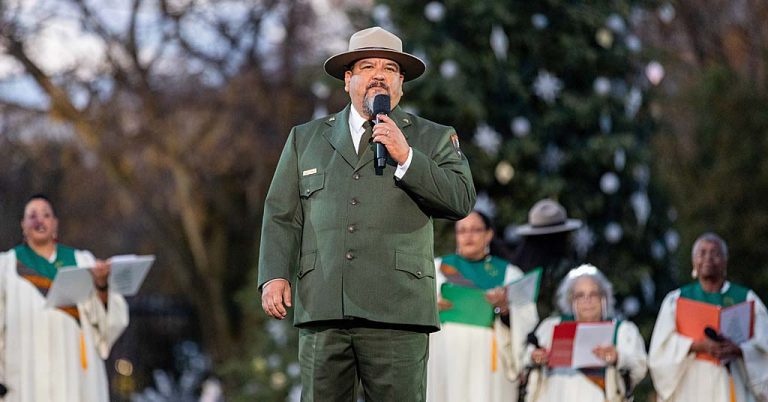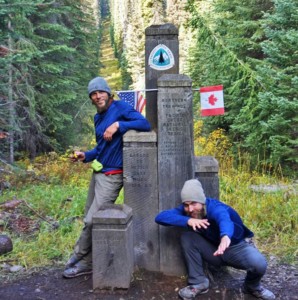
Seth and Paul reach the Canada-United States border, the northern terminus of the Pacific Crest Trail.
Packing it Out. Something big. Something audacious. By Susan Hess. Nov. 14, 2016. Photos courtesy of Packing it Out. Video by Miko Ruhlen
When you ask Seth and Paul what they picked up along the Pacific Crest Trail, the first thing they mention is the six-pound pair of boots. Not the 70-pound mattress, the red lantern, the TV frame, but the boots. Someone nailed an extra sole to the boots and lost or dropped them by the trail. Seth and Paul carried them 100 miles through the California Sierras. The 70 pound mattress they only had to carry a quarter mile. Really? Along a mountain trail?
Paul ‘Spice’ Twedt, 30, and Seth ‘Cap’ Orme, 26, met the summer of 2014 when they worked for a Minnesota wilderness guiding company. That winter, the slow time for guiding, they decided to hike the Appalachian Trail the next summer, but they also wanted to do something astonishing. Walking the 2,190 miles was not big enough.
On a visit home Orme went hiking. After a summer of being a guide, he automatically picked up trash as he hiked. “We set the example for the people we take out there. After a short hike, I was looking out, inspired by the beauty of the area, and holding a big bag of trash in my hand.”
Back in Minnesota, he told Twedt, “Man, we should try and clean up the whole Appalachian Trail.”
“That sounds audacious.”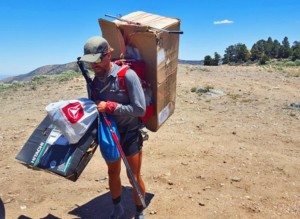
They picked up 1,100 pounds of trash summer 2015. The trail’s often steep grades and scrambling over and under boulders took a toll on them. Twedt said he hiked in pain every day from planter fasciitis and bone bruising. But they had found their career. They went back home to plan, train, and get sponsors for the Pacific Crest Trail.
Seth Orme has startlingly blue eyes. He talks fast and with such animated intensity that you have the sense of being swept along as he tells why they decided to clean two trails that together equal almost one fifth the circumference of the earth.
?The idea we came up with, cleaning, is one aspect, but really the thing we?re trying to do is inspire other people. We want to inspire this higher level of environmental stewardship. We?re
For the PCT, they trained for seven months: did 100 pushups every day, ran 40 miles a week and arrived at Campo, California May 6, 2016 prepared, professional. “You almost have to create your own challenges,” Twedt said. Paul Twedt is tall, thin, soft spoken, words come measured. He and Seth picked a challenge: to run 41 miles. Only later did they learned that on the July the heat index was 130 degrees.
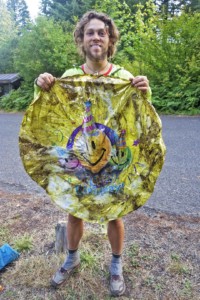
Days on the trail were mixed with side trips for speaking engagements. On their northward journey, when they reached the California-Oregon border, they were days short to be at the PCT Days Event in Cascade Locks, where they were to promote their sponsors. They bought a train ticket and rode the rail line to Portland, and from there hitched a ride to the event. At the end of the event, they had to get back to where they got off the trail, which was the other side of Oregon.
“Because the goal with a through hike is that you want to hike the length of the trail,” Twedt said. “You want to connect your footsteps all the way.”
They hitched rides down to Klamath Falls, and walked the PCT back to Cascade Locks.
Every day on the trail they picked up trash. 721 pounds in total: 27 Mylar balloons, bottles, the mattress, TV frame, vases. And the boots. “Outrageous. Outrageously heavy,” Twedt said.
The two men weighed what they picked up every day with a digital luggage scale, but the figure doesn’t include the most common thing they cleaned up: toilet paper.
“We bury it properly,” Twedt said, “the way it should be buried: according to Leave No Trace principles. We don’t count it, because I would get really negative. There’s no way to quantify that without it affecting our mindset, ’cause there is so much of it.”
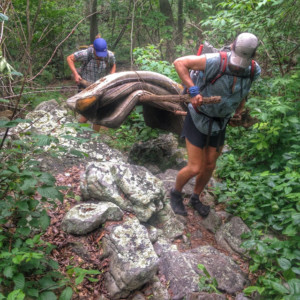 They also made sure the trash they picked got to a dumpster or trash can. Even the mattress. At an RV park near the trail, residents let them lean the mattress up against their dumpster.
They also made sure the trash they picked got to a dumpster or trash can. Even the mattress. At an RV park near the trail, residents let them lean the mattress up against their dumpster.
But there are almost no photos of trash on their blog: Packing it Out. The photos are almost all of the beautiful scenery and the quiet peace of back country. “A lot of people get this negative mentality and want to say, ‘Those people are terrible,’ Negative reinforcement doesn’t work; it’s the positive reinforcement that works,” Orme said. “We keep a positive attitude while we’re doing what we’re doing. We try not to just show pictures of trash, because we don’t want people to just see the negative. We want people to see what we’re doing is beautiful. It’s wonderful. We love being out here. These outdoor places are worth keeping beautiful.”
“We want to be these high energy people that people can be inspired by,” Twedt adds.
Still there were times when they got the ‘trash blues.’ “We usually don’t talk,” Orme said. “We just pick up. If we talk, it’s probably going to be something negative. We both know it’s trash blues time. Let’s just do it. Let’s knock this out. We get serious then we give ourselves a high five. Then we get a milkshake.”
Every now and then when you talk with them, they seem so sure, so confident in themselves, in their ability to meet any challenge, in the rightness of their goal. You wonder if they can hold on to this optimism; become our modern day John Muirs.
Below: Video interview of Seth and Paul at EnviroGorge.
Spice and Cap reached the PCT terminus at the Canadian border September 28. After dedicating some time to reflect on the trip, they’ll start planning next year’s expedition. It may be biking across the country, a book of short stories from the trail, more speaking engagements and stopping at communities across the country taking people out on local trails.
“We do the extreme side. We’re out for five months living out of a backpack picking up all this trash. It doesn’t matter if you’re going for a five minute hike or you’re going out for a five month expedition,” Orme said. “We can all take a little bit of time to pick up the trash that we find. That’s our hope.”


